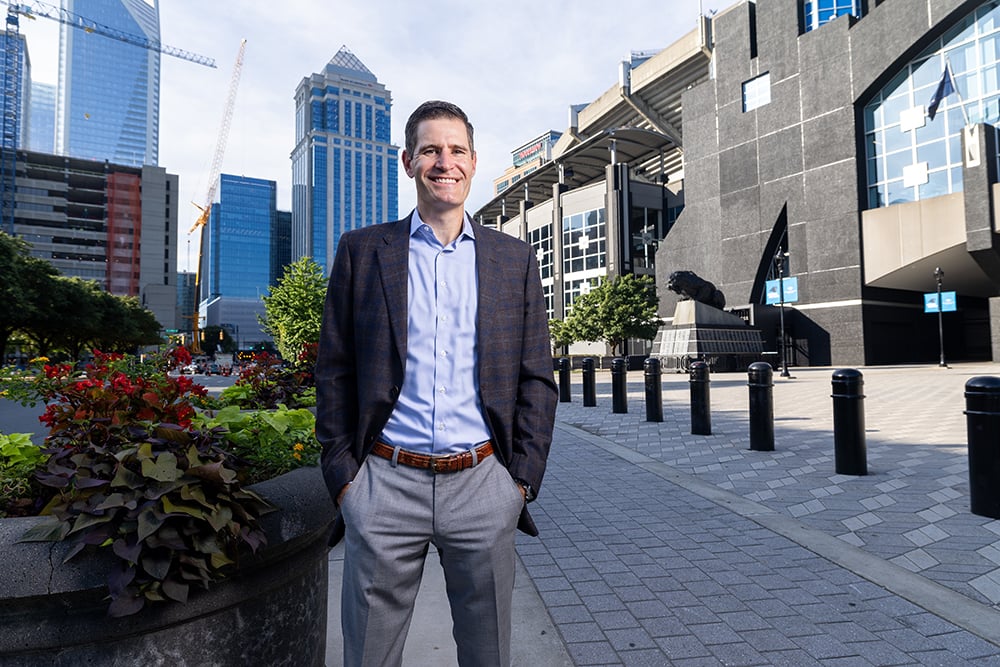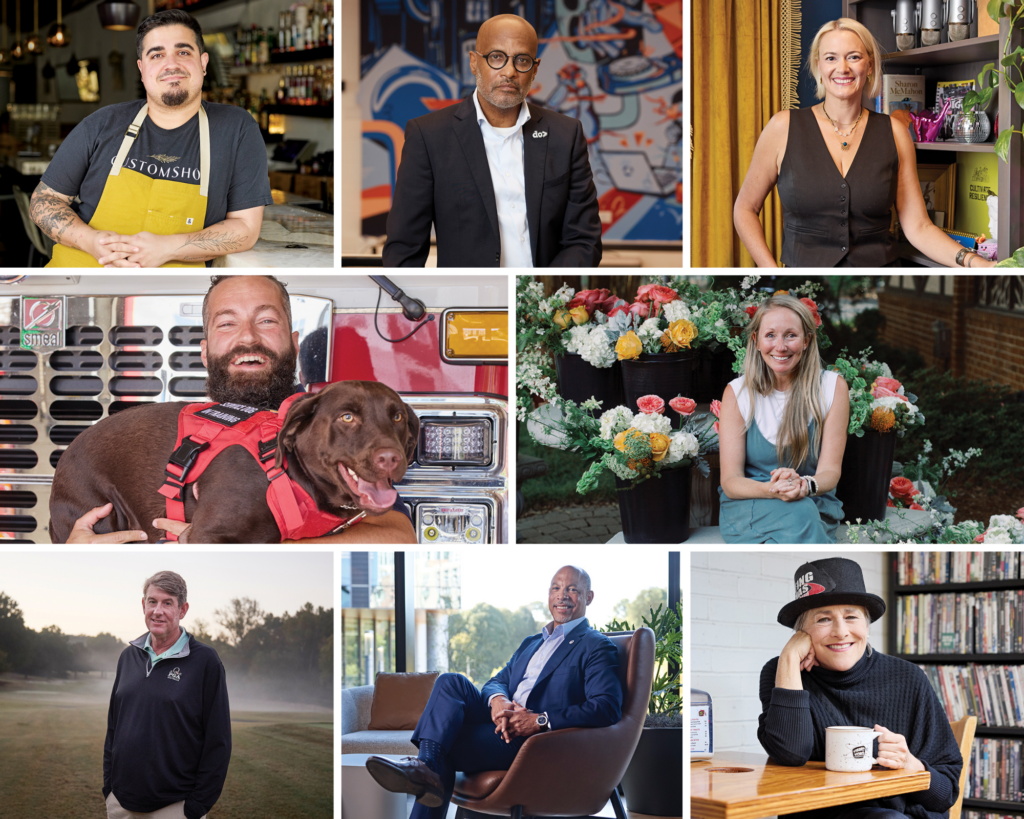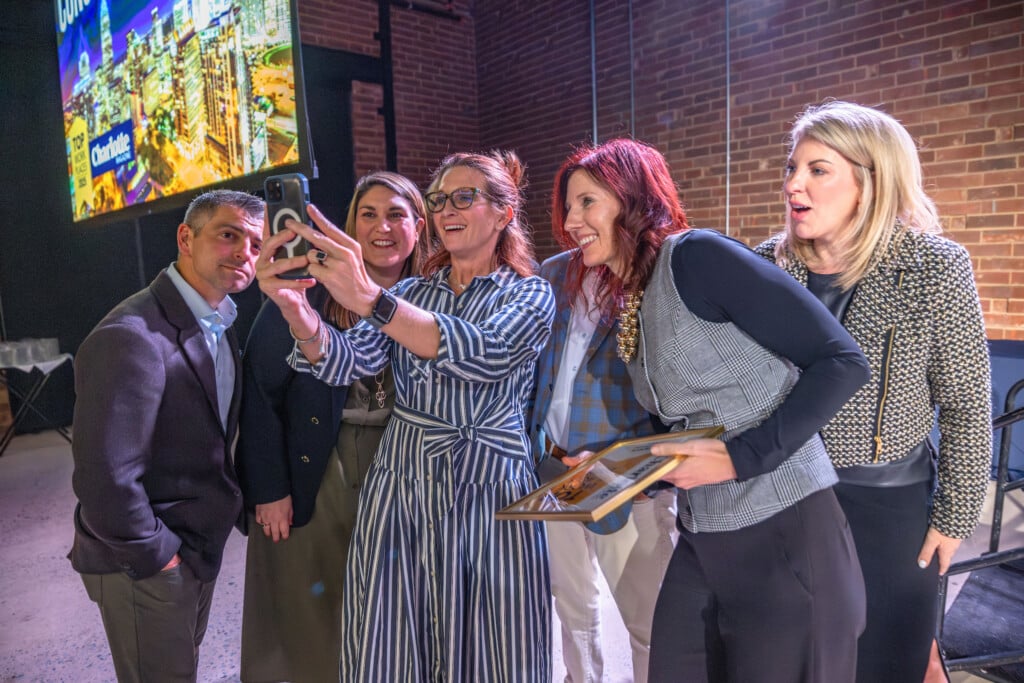Life Lessons With The Charlotte Sports Foundation’s New CEO
Will Pitts long-jumped from medical equipment sales to lead the city’s catalyst for sporting events

Will Pitts is slightly distracted the morning of June 9, when we meet near his office in SouthPark. It’s 9 a.m., and he explains that the Charlotte Sports Foundation, the events organization he’s led since April, has an announcement to make in two hours. It turns out to be another in a series of high-profile events the CSF has landed or created in recent years: the Dick Vitale Invitational, a new early-season college basketball game that, on Nov. 4, will pit Duke against Texas at the Spectrum Center. It’ll also honor Vitale, 86, a commentator and ex-coach who’s one of the sport’s most visible and vocal personalities.
The Vitale Invitational is a successor to the Jumpman Invitational, a college basketball tournament in the same arena for the men’s and women’s teams from North Carolina, Oklahoma, Michigan, and Florida. The CSF hosted Jumpman in conjunction with Michael Jordan’s Jordan Brand, and it ran its planned three-year course. “When we started the Jumpman Invitational, that was our singular college basketball event that was featuring both men and women,” Pitts says. “Then we started the Ally Tipoff, which is exclusively a women’s basketball event, shortly thereafter. This gives us a chance to create a men’s basketball event that really complements the women’s basketball game. … and it’s really a celebration of college basketball.”
The organization isn’t just a convener of basketball tournaments. It began in 2013 from the merger of two others: Charlotte Collegiate Football, a nonprofit that oversaw the Belk Bowl (now the Duke’s Mayo Bowl) and the ACC Football Championship; and the Charlotte Regional Sports Authority, which civic leaders formed after the city hosted men’s and women’s basketball Final Fours in the 1990s. Pitts, who’d been working for a distributor of Arthrex orthopedic equipment, knew Will Webb, the CCF’s then-director. Webb suggested Pitts come on board as director of sales. A decade and a half later, having ascended to chief operating officer, Pitts succeeded Danny Morrison—the former Carolina Panthers president, who has stepped into an advisory role—as CEO of what had evolved into the Charlotte Sports Foundation. Under Morrison’s leadership, the CSF branched out from a pair of annual football games in December to multi-season basketball, baseball, tennis, and running events.
Pitts, who turns 40 this month, was born in Atlanta but grew up in Charlotte—specifically, Plaza Midwood near Charlotte Country Club. He graduated from Charlotte Country Day School and Rhodes College in Memphis, participating in track and field at both. (He mentions the “hurdles” he’s overcome throughout his professional career—an unintentional allusion to what he later says was his worst track and field event, the 110-meter hurdles.) Pitts; his wife, Sarah; and their three sons, ages 8, 5, and 2, live in south Charlotte, where he runs the streets when he can. “I do have a passion for running,” he says, “although I don’t run as often as I’d like due to injuries and ailments.”
Here’s Pitts in his own words, edited for length and clarity.
I played a lot of sports growing up, but (track and field) was the one I ended up gravitating toward. In high school, I participated in lots of different field events and running events that were a little more middle distance-focused. Then, when I got to college, I did a multitude of events, from the 400-meter (dash) to the long jump, and eventually participated in the decathlon.
Through my experience as a student-athlete, I certainly took away key learnings about teamwork, time management, perseverance, discipline—just how to overcome adversity. You learn a lot in those experiences—through the early-morning practices, through the competitions themselves and through supporting your teammates—and a lot of that does translate well into life.
I had always had a passion for the sports industry. Through my time in college, I worked for a company called Vector Marketing, which sold CUTCO cutlery. I was selling knives through the summers of my college days. So I had some sales experience, and I had a passion for sports, and I was looking for the right opportunity when I graduated.
I actually interviewed with my later-to-be boss, Will Webb, after college, and we stayed in touch. He called me a few years down the road and said, ‘Hey, I’ve got an opportunity, as we’re starting this new entity called Charlotte Collegiate Football. You’ve been working in sales, and I always enjoyed our conversations. Would you be interested in joining Charlotte Collegiate Football in a sales role?’ And I said yes. I knew the medical device industry was not where I wanted to be long-term, so this was an opportunity to get in the sports industry and pursue a passion of mine.
One of my favorite books is The On-Purpose Person (by Kevin McCarthy). I think it’s really important to be intentional and thoughtful about one’s vision, the mission: understanding my purpose as a team member of the Charlotte Sports Foundation, and now my purpose and role as the CEO.
I think (the purpose is) creating the long-term sustainability of the organization and really developing and strengthening our vision long-term, which is to drive significant impact economically through sports and enhance the quality of life through sports. My role is to ensure that we’ve got a team, partnerships, and events that are going to fulfill that, and I really believe in empowering those around me to reach their potential. If I do that, and I provide them with the resources, tools, and support to do that, then we’ll be successful as an organization. It’s the concept of “a rising tide lifts all boats.” I think it’s the same thing if we can continue to drive success to our team members, our sponsors, our supporters, and our community.
We believe we’re well-positioned in Charlotte because of the collective harmony that resides in the community between the venues, the county, the city, and our partners, like the CRVA (Charlotte Regional Visitors Authority), that are excited to bring more unique sporting events to Charlotte. And we think we can help continue to grow our impact. That’s where I’ve been really focused in the just the last few months.
Sports tourism plays a significant part in the Charlotte economy. I think you can even look back to the men’s Final Four in ’94 and the women’s Final Four in ’96 as a catalyst for sports tourism in Charlotte. Moving the growth of those teams and those venues to really focus as the anchor of uptown, I think, has been critical to Charlotte’s growth and development.
Where we’ve really focused in recent years is getting involved in a variety of different sports, helping support all the venues in uptown to the extent we can—from Memorial Stadium, where we get the Meck Mile, and we help the ACC host several of their championships, like ACC Women’s Lacrosse and ACC Men’s Lacrosse—to bringing professional tennis and college basketball to the Spectrum Center. We’re working with Tepper Sports & Entertainment on college football, now baseball in (Bank of America) stadium, to Truist Field for the ACC Baseball Championship … We’re so fortunate to have the first-class venues that we have anchored in the center city. Our role, we think, is to really complement the current landscape and the sports ecosystem by bringing new special events to those venues.
I think the investment that the city is making in their significant renovation plan (for Bank of America Stadium) is fantastic and is only further going to enhance the fan experience and the athlete experience. It’s already great. We think it’s the best outdoor stadium in America.
We want to try to help capture every great sporting event opportunity that Charlotte’s presented with. We, as the Charlotte Sports Foundation, have to stay focused on the ones that really align perfectly with our vision and our mission. It (requires) continuing to really strengthen that partnership so that Charlotte can capture every event that is interested in calling Charlotte home—but we’ve got a really small team, and we may not be able to take the lead on every event that presents itself.
I really enjoy being outside. I enjoy being active. I enjoy participating in sports with my children whenever I can, whether that’s throwing the baseball in the backyard or shooting basketball in the driveway. We encourage them to try every sport and every activity that they’re interested in, so I get to do that alongside them, whether it’s lacrosse or baseball or basketball—you name it. For me, it’s pickleball. I typically don’t run very far anymore. Around the neighborhood, around SouthPark, not too far.
I’ve also gotten into youth coaching with the kids. I’m coaching my boys in flag football and baseball, respectively this past year, which was fun. I was an assistant coach in both scenarios, so I don’t take any credit, but it was fun being able to coach them.
I became the first base coach for baseball. So the moment where I’m standing there, watching my middle son step up to the plate and focus, the fulfillment he gets when he makes contact with the ball and then runs to first base, and I get to share that moment with him, being on the field—it’s pretty fun, because I’ve seen the frustration in the 100 pitches where he didn’t make contact and he wanted to be able to hit the ball, to get out on the field, to do it in a competition. That success is pretty special.
Oh, I’ve learned a lot from Danny (Morrison). Anyone who knows Danny knows he’s one of the most humble, modest human beings you’ll ever meet. He always talks about authenticity: Be yourself and operate with integrity. Danny embodies all those things. Ultimately, his principle is: Just do the right thing. If you do the right thing, it’s going to work out pretty well for everybody.





